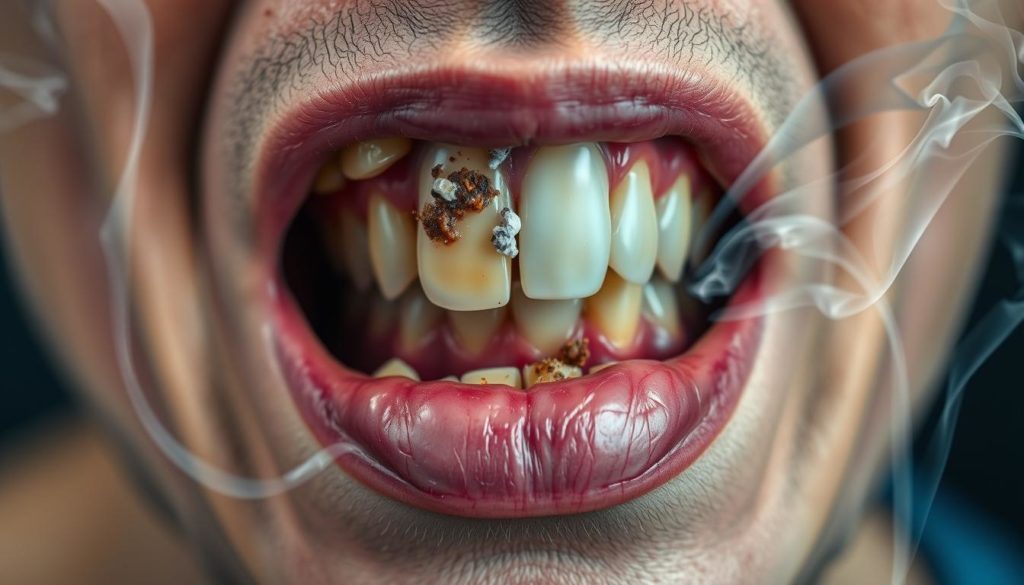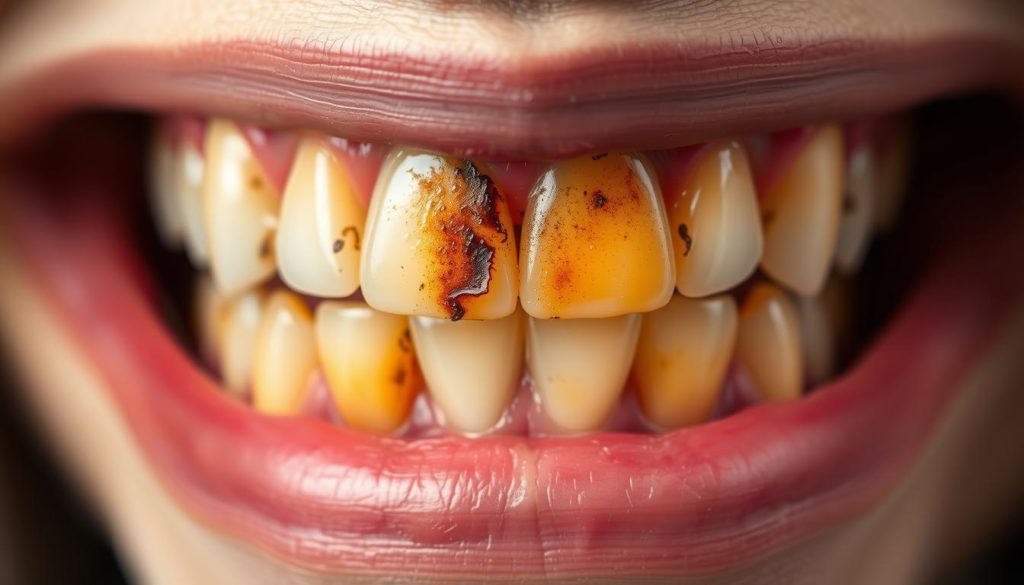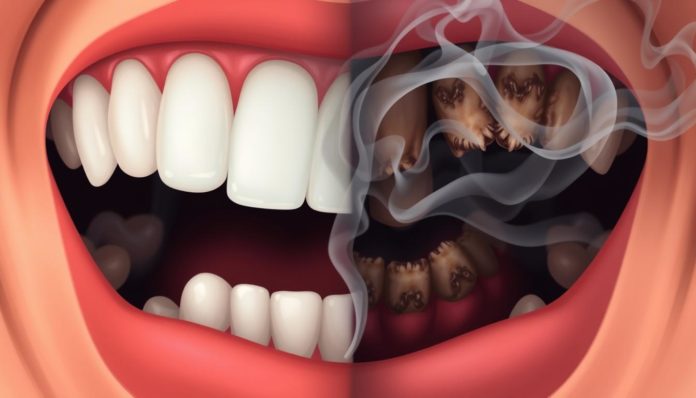Did you know smokers are six times more likely to get severe gum disease than non-smokers? This fact highlights the significant impact of tobacco on dental health.
Smoking affects more than just breath and tooth color. It is closely linked to many oral health issues. Health problems can be both quick to appear and last a long time. These include more chances of tooth decay and a greater risk of oral cancer amongst others.
It’s important to understand these dangers. Equally important is taking steps towards stopping smoking. Talking to healthcare experts is vital. They help diagnose problems correctly and treat the effects of smoking on your dental health effectively.
Introduction to Smoking and Oral Health
Smoking harms health in many ways. Yet, its impact on oral health gets less attention. Effects of smoking on oral health include tooth staining and gum disease. They also lead to tooth loss and even oral cancer. It’s critical to understand these effects fully.

The Connection Between Smoking and Dental Health
There’s a clear link between smoking and poor dental health. Smokers face a higher risk of gum disease because the toxins in cigarettes inflame and infect gums. The dental health risks of smoking also weaken the body’s infection defense. This makes severe gum diseases more likely.
Why It’s Important to Address the Issue
Effects of smoking on oral health matter not just for a nice smile. They’re linked to severe problems like tooth loss and oral cancer. By fighting smoking, we can improve dental and overall health. So, stopping smoking and taking preventive steps is crucial.
| Risk | Impact on Dental Health |
|---|---|
| Gum Disease | Increased risk of infection, inflammation, and tooth loss |
| Tooth Staining | Nicotine and tar cause significant discoloration |
| Oral Cancer | Higher occurrence of malignant lesions in the mouth due to tobacco exposure |
The Impact of Smoking on Your Teeth
Smoking can seriously harm your dental health, often in very visible ways. The nicotine and tar in tobacco can quickly turn your teeth yellow. This greatly changes how your smile looks.

Tooth Staining and Its Causes
One clear effect of smoking is how it stains your teeth. Chemicals in tobacco stick to your teeth, leaving hard-to-remove stains. Over time, heavy smokers may see these stains turn brown.
How Nicotine and Tar Affect Tooth Color
Nicotine and tar from cigarettes do a lot of damage. They leave a sticky layer on your teeth. This layer lets stains seep deep into the enamel. It makes tooth discoloration much worse and hard to fix without a dentist’s help.
Also, being around these chemicals for too long not only stains your teeth. It can also make other mouth health problems worse. Knowing how nicotine affects teeth is important. Especially if you want to keep a healthy smile while smoking.
| Issue | Cause | Result |
|---|---|---|
| Yellowing of Teeth | Nicotine and Tar | Discolored Teeth |
| Brown Stains | Heavy Smoking | Severe Discoloration |
Smoking and Gum Disease
Smoking is closely linked to oral health problems, especially gum disease. It’s crucial to understand how smoking affects your gums. This knowledge helps in keeping your mouth healthy and avoiding severe issues.
Understanding Periodontal Disease
Gum disease, or periodontal disease, is the inflammation and infection of the mouth’s support system. It starts as gingivitis and can get worse, becoming periodontitis, without treatment. Symptoms include swollen gums, bad breath, and loose teeth.
How Smoking Causes Severe Gum Disease
Smoking increases bacterial plaque on teeth and gums. It also lowers oxygen in your blood, making it hard for gums to heal. These effects cause gum disease to progress faster in smokers.
Smokers face a higher risk of severe gum disease. This often leads to losing teeth.
Prevention Tips for Smokers
To prevent gum disease, smokers should practice good oral hygiene and see a dentist regularly. Here are some tips:
- Brush and Floss Regularly: Brushing and flossing twice a day helps remove plaque.
- Use Antimicrobial Mouthwash: This reduces mouth bacteria.
- Schedule Regular Dental Check-Ups: Dentists catch gum disease early and clean teeth professionally.
- Consider Quitting Smoking: Cutting down or stopping smoking reduces gum disease risks.
- Maintain a Healthy Diet: Eat foods high in vitamins and minerals to help gums.
By using these tips daily, you can better prevent gum disease, even as a smoker. Taking steps to avoid smoking-related gum problems helps keep your mouth healthy.
Oral Cancer: A Major Risk Factor
Smoking is a top cause of oral cancer. It’s key to know how tobacco use links to this deadly disease. Spotting early signs and taking action can greatly lower your risk.
The Link Between Smoking and Oral Cancer
There’s a strong link between smoking and oral cancer. Tobacco’s chemicals can harm mouth and throat cells, causing cancer. Smokers have a much higher risk of developing mouth cancer than non-smokers.
Early Signs of Oral Cancer
Finding oral cancer early is crucial for effective treatment. Look out for lasting sores, lumps, or thick spots in the mouth. Trouble with swallowing, chewing, or voice changes should prompt a doctor’s visit.
Steps to Lower Your Risk
Quitting smoking is the best way to cut oral cancer risk. Getting regular dental checks helps find cancer early. Eat well, with lots of fruits and veggies, and drink less alcohol to further reduce risk.
| Risk Factors | Preventive Measures |
|---|---|
| Smoking | Quit smoking |
| Alcohol Consumption | Limit intake |
| Poor Diet | Healthy eating |
| Lack of Dental Check-ups | Regular visits |
Smoking-Related Dental Problems
Smoking does more than just stain teeth and cause gum disease. It opens the door to many dental issues. These problems can really affect a person’s oral health.
Common Issues Beyond Staining and Gum Disease
Besides stained teeth and gum problems, smokers also face other dental issues. They often have bad breath that won’t go away. They also deal with more plaque and tartar, which can cause cavities and tooth decay.
Long-Term Effects on Oral Structures
Smoking for a long time seriously harms your mouth’s support system. It damages the gums and jawbone. This damage can result in losing teeth and might require complicated dental work to fix.
It’s really important for smokers to see their dentist regularly. They should also use dental products made for smokers. This can help slow down dental issues caused by smoking.
| Issue | Short-term Effects | Long-term Effects |
|---|---|---|
| Tooth Staining | Discoloration and yellowing | Permanent stains |
| Gum Disease | Inflammation, bleeding gums | Periodontal disease, tooth loss |
| Bad Breath | Persistent halitosis | Chronic bad breath |
| Plaque Build-Up | Increased plaque and tartar | Cavities and decay |
| Oral Structure Damage | Weakened gum and support structures | Jawbone erosion, tooth loss |
The Role of Effective Oral Hygiene for Smokers
For smokers, keeping up with oral hygiene can be tough. This is because smoking harms teeth and gums. But, with the right dental care, smokers can lessen this damage and keep their smiles bright.
Essential Brushing and Flossing Tips
Good oral care for smokers begins with regular brushing and flossing. It’s important to brush twice a day. When you brush, use a soft-bristled toothbrush. This helps protect your enamel from more harm.
- Brush your teeth with fluoride toothpaste designed for smokers, which helps in removing stains and preventing plaque build-up.
- Use dental floss daily to clean between teeth and around the gumline, where a toothbrush may not reach.
- Consider using an electric toothbrush for a more thorough cleaning, as it can be more efficient in removing plaque.
Choosing the Right Dental Products
Selecting the right dental products is key for smokers. Look for special toothpastes and mouthwashes. These products are made for smokers and can be a bit rougher. They do a better job at getting rid of stains.
| Product | Benefits | Recommended Brands |
|---|---|---|
| Toothpaste for Smokers | Removes stains, freshens breath | Colgate, Crest, Arm & Hammer |
| Mouthwash | Kills bacteria, freshens breath | Listerine, ACT |
| Electric Toothbrush | More effective at removing plaque | Philips Sonicare, Oral-B |
| Floss | Removes plaque between teeth and around the gumline | Oral-B Glide, Reach |
By following these tips and picking the right products, smokers can maintain better oral health. This way, you can reduce the bad effects of smoking on your teeth and gums.
Smoking Cessation and Oral Health
Quitting smoking greatly boosts your health, especially your mouth’s health. Stopping tobacco use leads to better oral hygiene and health. Let’s look at how stopping smoking helps your mouth.
Benefits of Quitting Smoking
Stopping smoking has many perks, not just for your mouth. Studies show that quitting cuts your risk of oral diseases. People who quit have fewer gum issues and lose fewer teeth.
The benefits of quitting smoking also mean fewer oral cancers. Stopping for good allows your mouth to heal and lowers the chance of serious problems.
Immediate and Long-Term Oral Health Improvements
Stopping smoking means quick wins for your mouth health. Saliva goes back to normal, reducing dry mouth and decay. Your mouth’s tissues also begin to heal, which leads to a healthier mouth lining.
Over time, stopping smoking greatly reduces gum disease risks. It means less dentist visits for serious issues and better teeth cleaning. Here’s more info on what changes you can see:
| Impact | Immediate Improvements | Long-Term Improvements |
|---|---|---|
| Tooth Decay | Reduced Dry Mouth | Lower Risk of Cavities |
| Gum Health | Decreased Inflammation | Improved Periodontal Health |
| Oral Cancer | Lowered Immediate Risk | Significantly Reduced Long-term Risk |
Quitting smoking is clearly the best choice for oral health. A smoke-free life prevents serious dental problems and boosts your overall health, making life better.
Special Dental Care Tips for Smokers
Smoking can hurt your oral health a lot. So, smokers need to be extra careful with their dental care. Going to the dentist regularly is key. This helps find any problems early. Smokers can fight the bad effects of tobacco on their teeth by doing this.
Recommended Dental Visits
Smokers should see the dentist more often than others. These visits should include normal check-ups and extra cleanings. Dental hygienists remove plaque and tartar during these cleanings. Going to the dentist often helps catch and treat problems like gum disease early.
Importance of Regular Check-Ups
Regular check-ups are very important for smokers. They let dentists check for any changes or problems that need attention. These exams help spot early signs of serious issues, like oral cancer. Smokers can keep their mouths healthy by going for these check-ups often.
FAQ
How does smoking affect oral health?
Smoking can hurt your mouth in many ways. It can stain your teeth and harm your gums. It can even lead to tooth loss and oral cancer. Smoking also causes bad breath, creates more plaque and tartar, and weakens the mouth’s structure.
Why is it important to address oral health risks associated with smoking?
It’s vital to deal with these risks because smoking speeds up the damage to oral health. Smokers are more likely to get gum disease, lose teeth, and get oral cancers. Quitting smoking and keeping your mouth clean can greatly help.
What causes tooth staining in smokers?
Tobacco’s nicotine and tar quickly yellow teeth. Heavy smoking can turn teeth nearly brown after a while.
How does smoking lead to gum disease?
Smoking makes more bacterial plaque while reducing oxygen in the blood. This stops infected gums from healing. This makes gum disease progress faster in smokers, which can lead to losing teeth.
What are the early signs of oral cancer caused by smoking?
The early signs include long-lasting mouth sores, strange lumps, red or white mouth patches, trouble swallowing, and voice changes. Always see a healthcare professional if you notice these signs.
What are some smoking-related dental problems besides staining and gum disease?
Smoking also causes bad breath and more plaque and tartar build-up. Over time, it damages the mouth’s structure.
What oral hygiene tips are essential for smokers?
Smokers should brush twice daily, floss every day, and use mouthwash. Using a smoker’s toothpaste helps due to its stronger cleaning power. But, be gentle to protect your enamel.
What are the benefits of quitting smoking for oral health?
Quitting smoking reduces the risk of gum disease, oral cancer, and other dental problems. Your oral tissues can heal with time, and teeth may stain less.
How often should smokers visit the dentist?
Smokers should see the dentist more often for check-ups and cleanings. This helps find and treat smoking-related oral health issues early.


